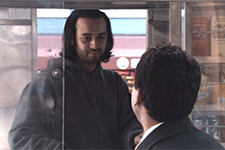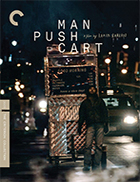Man Push Cart
|  For Italian screenwriter Cesare Zavattini, who is often referred to as the father of neorealism, a film becomes “spectacular not through its exceptional, but through its normal qualities; it will astonish us by showing so many things that happen every day under our eyes, things we have never noticed before.” That is exactly what Man Push Cart, Ramin Bahrani’s second feature film, does so beautifully and so powerfully. It is a film in the neorealist vein, one of close observation and conviction that brings us into a world that many of those who live in larger cities see every day—right under their eyes—but probably rarely if ever stop to consider. As the title suggests, Man Push Cart takes place within the world of pushcart vendors—those men and women who serve food out of mobile food carts that are set up on the sidewalks along busy thoroughfares. We tend to take their existence for granted and probably don’t think much about what it takes to run such an operation. Bahrani, who spent two years talking with pushcart vendors before making the film on a miniscule budget on location in post-9/11 Manhattan, uses close observation and repetition to not just reveal, but to find genuine drama in, the realities of these operations through the character of Ahmad (Ahmad Razvi), a Pakistani émigré who runs a pushcart that serves coffee and pastries. We see him over and over again going to a nondescript warehouse in the early hours of the morning, stocking up on supplies, and then pulling the shiny, stainless steel cart, whose sides look like they have been quilted, down the dark street with traffic swirling around him to his appointed place, where he sets up the cart, stocks the shelves, and brews coffee and tea so that he is ready when the first customers stop by on their way to work. The act of pulling the cart becomes a kind of recurring metaphor for his existence, as it requires both strength and care to guide the cart down the busy streets, and at every moment it seems like the cart could slip out of his control (at one point, he does fall down and temporarily loses control, and it is a moment that is as heart-stopping as you will find in any thriller). Ahmad’s activities are fundamentally banal, as are so many of our work-a-day routines, but Bahrani invests them with a sense of life and purpose. This is, after all, Ahmad’s livelihood, and we get the sense that he takes pride in his work, even as he remains fairly opaque as a character. We do learn bits and pieces about him. His wife died sometime in the recent past and his mother-in-law blames him for the death and refuses to let him see his young son, who he wants to care for, but does not have the means to do so. We also learn that back in Pakistan he was a notable celebrity, a pop singer with several albums to his credit, although we never really hear any of the music he recorded and he shies away from all opportunities to sing in front of others. We learn that he is close to paying off the food cart and assuming full ownership of it, which suggests a determination on his part to “make it” in America, to fulfill the proverbial American dream of owning his own business, calling his own shots. In his interactions with Mohammad (Charles Daniel Sandoval), another Pakistani émigré who has made it in the business world and both befriends Ahmad and also uses him for labor around his upscale apartment, we learn that Ahmad is not particularly outspoken. In his interactions with Noemi (Leticia Dolera), a young woman from Madrid who manages a newsstand down the block from his food cart, we learn that Ahmad wants some kind of companionship, even as he is unwilling to give in to such desires. There is no plot to speak of in Man Push Cart, although there is a third act catastrophe that forces Ahmad into a place of desperation that significantly escalates the drama. There is something of a love triangle among Ahmad, Noemi, and Mohammad, but little is made of it, much like little is made of his past as a pop star (once could easily imagine a very different movie making that its main focus). Bahrani keeps the film’s focus on Ahmad’s daily activities and interactions, which grow familiar to us and therefore feel close, even as we realize when the film is over how little we really know about Ahmad. In some ways this reflects the nature of his relationships with others—not just Noemi and Mohammad, but also the various cab drivers, food vendors, and shopkeepers with whom he regularly interacts, as well as his repeat customers. His face is familiar to them and they “know” him, but they don’t know him. He remains slightly removed, a regular presence that comes to be taken for granted. Bahrani frequently shows Ahmad thinking or watching, but we don’t really know what he is thinking or watching. In a lesser film that might be considered frustrating, but Bahrani turns it into his film’s primary strength, as the inherent ambiguity of Ahmad’s life keeps us engaged while also reminding us of those “many things that happen every day under our eyes, things we have never noticed before.” After seeing Man Push Cart, we notice.
Copyright © 2021 James Kendrick Thoughts? E-mail James Kendrick All images copyright © The Criterion Collection | |||||||||||||||||||||||||||||
Overall Rating: 


 (3.5)
(3.5)


